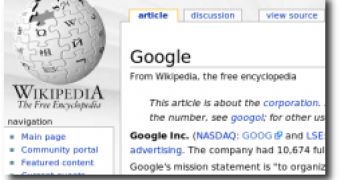Because Wikipedia is one of the main sources of information on the Internet, it attracts most publishers to post links to its articles, weblinks that obviously increase the number of visitors. Of course, Google is one of the companies that send an impressive amount of traffic to the service because some of the information searched on the search engine links to the articles posted on Wikipedia. Recently, the search giant added another feature that can boost the number of visitors redirected to the service: users are now able to search for articles published on Wikipedia by typing info or information before the desired keyword. Google will return several links but the first one will display a short phrase from Wikipedia that describes your keyword.
"The open encyclopedia last month broke into the US' list of top 10 websites, up four places on the previous month. Now researcher LeeAnn Prescott has revealed that 70% of Wikipedia's hits come from search queries, and 50% from Google alone. "Google's share of Wikipedia's upstream traffic from Google has increased by 19% over the past year, at the same time that Wikipedia's market share of US visits increased by 143%," Prescott wrote. "Last week Wikipedia was the #3 website in Google's downstream, after Google Image Search and MySpace," E-consultancy reported.
Although this might look like a real market hit for Wikipedia, a huge increase of traffic for a website can represent more expanses from the provider especially for the bandwidth used by all the visitors redirected to the page. In the past, the giant portal Yahoo helped Wikipedia with server space in Asia but Google, the most important visitors provider for the company, didn't offer any donation to the online encyclopedia.

 14 DAY TRIAL //
14 DAY TRIAL //